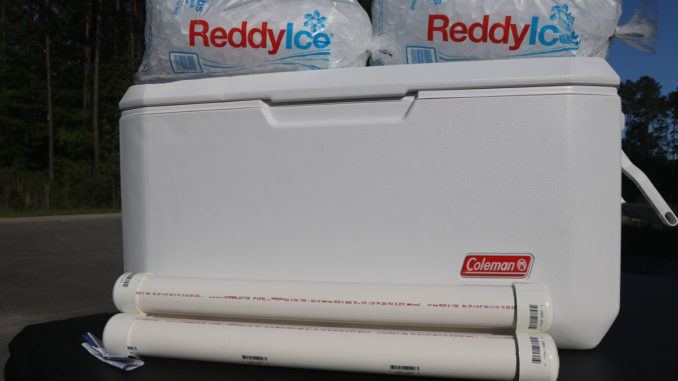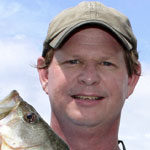
Murrells Inlet angler keeps things cool
One of the biggest challenges for anglers this month is keeping things cold, starting with food and beverages and ending with the fish they want to haul back to the dock. While many bigger boats have their own ice makers, most everyday anglers don’t have that luxury. Fortunately, they have more options than ever when it comes to coolers and accessories, but once anglers leave the dock, they have to make whatever ice they have last as long as possible. Norm Sutton of Murrells Inlet has learned a few tips that help make his ice last for trips that sometimes include overnight stays on the water.
“I fish out of a 23-foot boat, so space is at a premium, but one thing I know I can never have enough of is ice,” said Sutton, who spends most of his time fishing livebottom areas that are two to three hours from the public boat landing in Murrells Inlet. Because he catches a wide variety of species — from black sea bass to cobia — Sutton must have a cooler big enough to handle his catch, plus enough ice to keep it from spoiling.
“I carry at least two 120-quart coolers. On the bottom of each cooler, I place PVC pipes that are sealed full of frozen saltwater. Then I dump ice on top of that and fill each cooler completely to the top with ice,” said Sutton, who also takes a smaller cooler for sandwiches and beverages.
The PVC pipes full of frozen saltwater, according to Sutton, keep the coolers colder for a longer period than regular ice. It’s a trick he learned in a college chemistry class.
“I honestly still don’t understand why, but it’s a fact that it takes saltwater longer to turn to ice, but once it does, it is actually colder than regular ice, and takes longer for it to melt,” he said. “Putting that in the base of each cooler helps keep the rest of the ice frozen longer, and it doesn’t take up much room.”
New fishing partners often ask Sutton where they will put the fish, because his coolers are so full of ice that nothing else will fit.
“”That’s a good problem to have,” said Sutton. “I carry cooler bags in my boat. They fold up nice and flat. I’ve got quite a few crammed into storage spaces throughout my boat. Once we get into some fish and need room in the cooler, I start moving ice into the cooler bags. It will melt quicker there, but it’s better than throwing it overboard. You can use it to pour ice into the food cooler throughout the day. Ice is going to melt faster in that cooler because you’re constantly in and out of it getting food and drinks. The only alternative is starting off with less ice, and you’ll never be able to make more out there, so I just take as much as I can.”
Sutton said starting off with your coolers as cold as possible also helps.
“A lot of people leave their coolers outside or in the garage and just fill them with ice on the way to the boat landing,” he said. “If a cooler has been in the sun or a hot garage, it’s going to retain that heat. Once you dump ice in, it has to fight that heat for a little bit. Everyone knows that even in the best cooler, heat will eventually win, so I’m not going to give it a head start. I put several bags of ice in my coolers the night before I go fishing, so it’s already cool once you dump a day’s worth of ice in them.”
When making his PVC freeze pipes, Sutton uses 2-inch pipe in lengths that fit the bottom of his coolers. He glues a cap on one end and lets it sit an hour to dry. He then pours a pre-made mixture of saltwater — 1/2-quart of salt per gallon of water — into the tube, glues a cap on the other end, then puts it in his freezer, where it takes several days for the saltwater to freeze. He uses several on each trip, and uses them over and over until his buddies “swipe them for their own use.”
Anglers should also avoid opening the cooler for any reason other than to add fish.
“Anytime you open the cooler, you’re letting hot air in,” Sutton said.




Be the first to comment